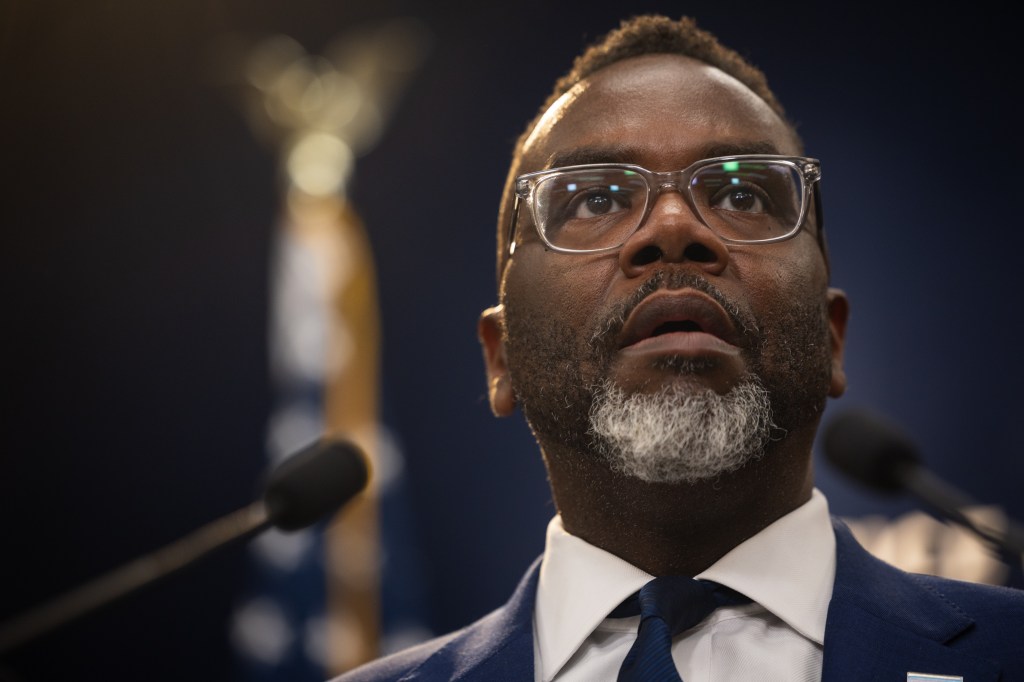Mayor Brandon Johnson on Tuesday pointed to a handful of tax-the-rich options he might consider to balance Chicago’s next budget, among them a corporate head tax.
Johnson faces a daunting challenge as he tries to put together a 2026 budget that closes a huge shortfall without a property tax hike while trying to avoid firing city workers.
To make it work and get it through a City Council that has been cool to his past proposals, he wants Chicago’s “billionaires and ultra rich” to “put more skin in the game,” he said during a news conference.
The first such wealthy-targeting option he was asked about Tuesday: a per-employee head tax similar to the one in place for decades before being eliminated by Mayor Rahm Emanuel.
“It’s an option, it’s an option,” Johnson said about bringing the tax back in some form.
As he campaigned, Johnson proposed reinstating the monthly $4-per-employee head tax on large companies in place from 1973 to 2014. Pressed on why he hasn’t sought such a levy in his first two years in office, Johnson rattled off a list of campaign promises kept.
“There are a lot of things that I said I was going to do, and I’ve done it. There will be no exception in this regard,” he said. “This is the perfect time for us now to look at progressive means so that we can continue to demonstrate the positive trend here.”
Johnson’s calls for “progressive revenue” — a common, but often unspecific refrain from the mayor — comes as many of the options his administration might otherwise rely on to drive up revenue look politically tenuous.
The mayor pledged last week to not propose a property tax hike after his chief financial officer, Jill Jaworski, called such a hike “likely.” He has called for the city to maintain a 1% grocery tax of its own as the state’s version of the tax expires, though he has not pushed the tax to a vote in the face of broad aldermanic pushback.
As he takes on next year’s extra-challenging budget, Johnson has assembled a “fiscal sustainability working group” team that includes leaders of corporations, unions and civic groups alongside City Council members.
The Institute for Public Good, a progressive think tank, recently proposed a similar new “corporate excise tax.” The tax would charge 5% of the cost of payroll for employees that earn more than $200,000 at companies with more than $8 million in payroll.
Head taxes are a rare “home rule” levy, meaning the city would not need state approval to issue one. Johnson’s efforts to win support in Springfield for other new taxes has so far largely failed.
Progressive groups such as the Chicago Teachers Union have praised the head tax idea, but critics argue it provides a disincentive for companies to hire more employees.
Johnson contended a head tax is not a job killer. Instead, violence is the “number one issue” that corporate leaders bring up, he said Tuesday.
The mayor’s administration is also looking at a “payment in lieu of taxes” program, he added. He has in the past pointed to wealthy universities that operate in and around the city, such as the University of Chicago or Northwestern University, as potential entities the city could seek such an agreement with.
Later, Johnson said he is also eyeing a tax on digital advertisements. He worked on a similar tax in Maryland years ago, and “people have made billions of dollars from the digital industry,” he said.
Johnson repeatedly highlighted a through-line in his tax proposals: They would target the rich. Over 127,000 millionaires and at least 25 billionaires live in Chicago, he said.
“There’s a reason for us to be able to tap into those individuals and entities with means so that we can continue to see the positive trend of violence going down in the city of Chicago,” he said. “It’s to all of our benefit to ensure that we’re doing everything in our power to maintain the investment that we put forward.”
Asked if he fears taxes that target rich people will push Chicago’s wealthiest residents out of the city and its tax base, the mayor said the city’s millionaire population is growing fast.
“This notion somehow that we’re scaring millionaires away, it’s just the opposite,” he said. “The ultimate goal is to grow the economy. This is not about billionaires versus everyone else. This is about the city of Chicago coming together collectively.”
Originally Published: July 29, 2025 at 12:01 PM CDT
